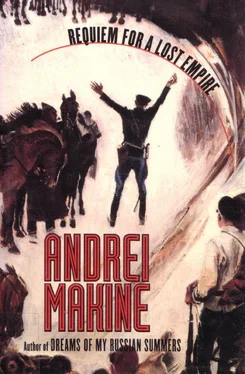I got up, wanting to confide these thoughts to you in all their despairing simplicity: no, I do not begin to understand this grotesque organism, for there is nothing to understand. I crossed our room in the darkness streaked with reflections from the flames, I joined you at the window.
"One day it must be possible to tell the truth." I was going to give you my reply: the truth about our age was a young body steeped in beauty creams, the human flesh the arms dealer treated himself to, in exchange for his rocket launchers. And this trade, the tragicomic outcome of global maneuvers, had ordained that today, in that precise spot, a soldier, wearing a leather band on his wrist, should be blown to pieces by an explosion. The truth was absolutely logical and absolutely arbitrary.
Just as I was about to say this to you, I noticed what you were doing. Hands raised halfway up the window, you were darning the torn mosquito screen. Long stitches of pale thread, movements very slow, guided by the needle as it felt its way in the darkness, but there was also another slowness, that of a deep reverie, of a lassitude so great that it no longer even sought rest. It seemed to me that never before had I happened on you in such a relaxed state, at a moment in your life of such perfect harmony with yourself, with what you were to me. You were the woman whose shoulders my hand caressed lightly when they seemed cold in the sweltering heat of the night. A woman whose infinite singularity and troubling uniqueness, as the being I loved, I was aware of as never before and who, that night in this ravaged city, inexplicably found herself living so close to death, whether accidental or intended. A woman who was drawing two edges of fabric together on a night when the fighting had stopped. And who, noticing my hand at last, inclined her head, letting my fingers rest beneath her cheek and was already becoming utterly still, in a half sleep.
Your presence was one of total strangeness. And at the same time of completely natural necessity. You were there and the murderous complexity of this world, this tangle of wars, greed, vengeance, and lies found itself face to face with a truth beyond dispute. This truth was poised in your gesture: a hand closing up two pieces of fabric against a night glutted with death. I sensed that all the testimonies I could have offered were overtaken by the truth of that moment, snatched from the madness of men.
I did not dare, and in any case I would not have known how, to question you about the meaning of your words. I kissed the back of your head, your neck, the start of the fragile rosary of your vertebrae, transfixed by the tenderness a woman's body inspires when she is totally absorbed in a task she cannot interrupt. And so it was as a simple response to your desire for truth that I began telling you about the birth of the world in the eyes of that infant lost among the mountains. His fear of understanding, his refusal to name things, his life being saved by the music of an unknown language. He hesitated for a moment on the brink of our games of pleasure and death, then let himself sink back once more into the fraternal intimacy of the universe. The woman who held him in her arms went on softly singing her lullaby, even as the sound of gunshots reached them from the other bank of the stream. The unknown language was her mother tongue.
I embarked on this story beside the window, beside the rectangle of netting you were darning, I finished it in a whisper, leaning toward your face relaxed in sleep. I thought you had dozed off and missed the ending. But after my last words, without saying anything, you gave my hand a gentle squeeze.
There were times, long before I knew you, when I did go back to that night in the Caucasus and the sleeping child. These returns to the past allowed me to take refuge from sudden excesses of grief, horrors that were too overwhelming. They marked a dotted line of brief resurrections along the course of my life, following each of the temporary deaths that punctuate our lives. One such death had assailed me on the day when a fellow pupil, the leader of one of the little gangs that were rife at our orphanage, spat some crumbs of tobacco from his cigarette stub in my direction and hissed with explosive scorn, "Look, everyone knows about your father. The firing squad shot him like a dog!" Or another time when, out for a stroll, I chanced upon a woman deep in the long grass of a gully, half naked and drunk, being taken in brutal haste by two men, who puffed and panted with little false laughs and oaths. Against a dark background of lush June vegetation, her rotund, obese body was blinding in its pallor. She turned her head, and I recognized the simpleton whom the townspeople called by a little girl's pet name, Lyubochka. And then there was that birthday party with dishes of silver plate. Everyone tried to behave as if I were just like the others, tried not to notice my clumsy actions or to anticipate them. And their kindness was so evident that there was no longer any doubt: I would never be like them, I would always be that youth whose hands were red with cold, dogged by his past, who, if asked about his background, would sometimes stammer out truths that people took for wild lies and sometimes lie to reassure the curious. And there would always be, as there was that day, a very young child who would tug at his sleeve and ask him, "Why aren't you laughing with us?"
After each of these deaths I would once more find myself in my Caucasian night: I would see the face of the white-haired woman, her eyes fixed on my eyelids; I would listen to her song, crooned in a language whose beauty seemed to stand guard over this moment in the darkness.
Later on, when studying medicine, I tried to put an end to these returns to the past, seeing them as a sign of sentimental weakness, shameful for a prospective army doctor. I stopped being ashamed of them when I realized that night had had nothing in common with the soft-heartedness wrung from us by a happy childhood. For there had been no happy childhood. Only that night when, venturing across the frontier into the world, the child took fright and, through the magic of an unknown language, was able to retreat for a little longer into his earlier universe.
This was the universe I always returned to in my flights from the suffocations of life. And when, having joined the army, I found myself looking after soldiers in the undeclared wars waged by the empire at all four corners of the globe, little by little this night of the child became the sole remaining trace that allowed me to go on recognizing myself.
One day this trace was obliterated.
At first I convinced myself that the very last wounded man did exist. At the end of the very last war. Wars, I told myself, 'were small now, local, or so the diplomats said. So, logically, an end to them was thinkable. But I discovered soon enough that it was the big wars that came to an end, not the little ones; these were simply a continuation of the others in peacetime. For the first few months, perhaps a whole year, I kept a diary: customs of the country, characteristics of the inhabitants, scraps of life stories that wounded men confided to me. Then on to another country, another war, and I perceived that the differences in terrain and customs were increasingly blurred by the routine of fighting, with its monotony of suffering and cruelty, which is the same under every sky. Ethiopia, Angola, Afghanistan… Now the pages of my diary disgusted me, with their tone of the nosy tourist and the detachment of the observer who plans to leave tomorrow. By now I knew that I would not be leaving. My dreams were no longer peopled with human faces but with the gaping grins of wounds. Each had its singular smile, sometimes broad and fleshy, sometimes with an indented gash blackened with burns. And, like the filter on a camera, the same light colored all these dreams, the color of dirty blood, of rust on the carcasses of armored vehicles, of the reddish dust raised by helicopters bringing fresh wounded to the hospital. Often the same vision woke me: what I was stitching up was not the gaping grin of a wound but lips trying to speak. I would get up and, for several seconds after being switched on, the light seemed to alleviate the raging furnace where an old electric fan kept churning away. My watch showed it was the hour at which soldiers returned from night operations. Standing at the mirror, I would try to reassemble the man I must once more become in the morning. I would make the effort for several seconds, then return to the child hidden in the mountains of the Caucasus.
Читать дальше










